Distilled is a thematic drafting and set collection game that will leave you tipsy!
There’s no doubt that we live in a Golden Age for thematic board games. Long gone are the days of pasted-on themes about trading in outer space or Ancient Greece, and instead we have games like Distilled, which take the specific passions of a design team and explore them thoroughly.
Distilled is a midweight game about owning and operating your own distillery. Players will choose a character and take a player board with various spaces for cards to be played into. They’ll take a unique ingredient that only their character can access, and a matching signature recipe token to go with it. Then everyone will be given a matching recipe card with seven types of alcohol on it — and everything from Whisky and Gin to Grappa, Lambanog and Shochu can be found here.
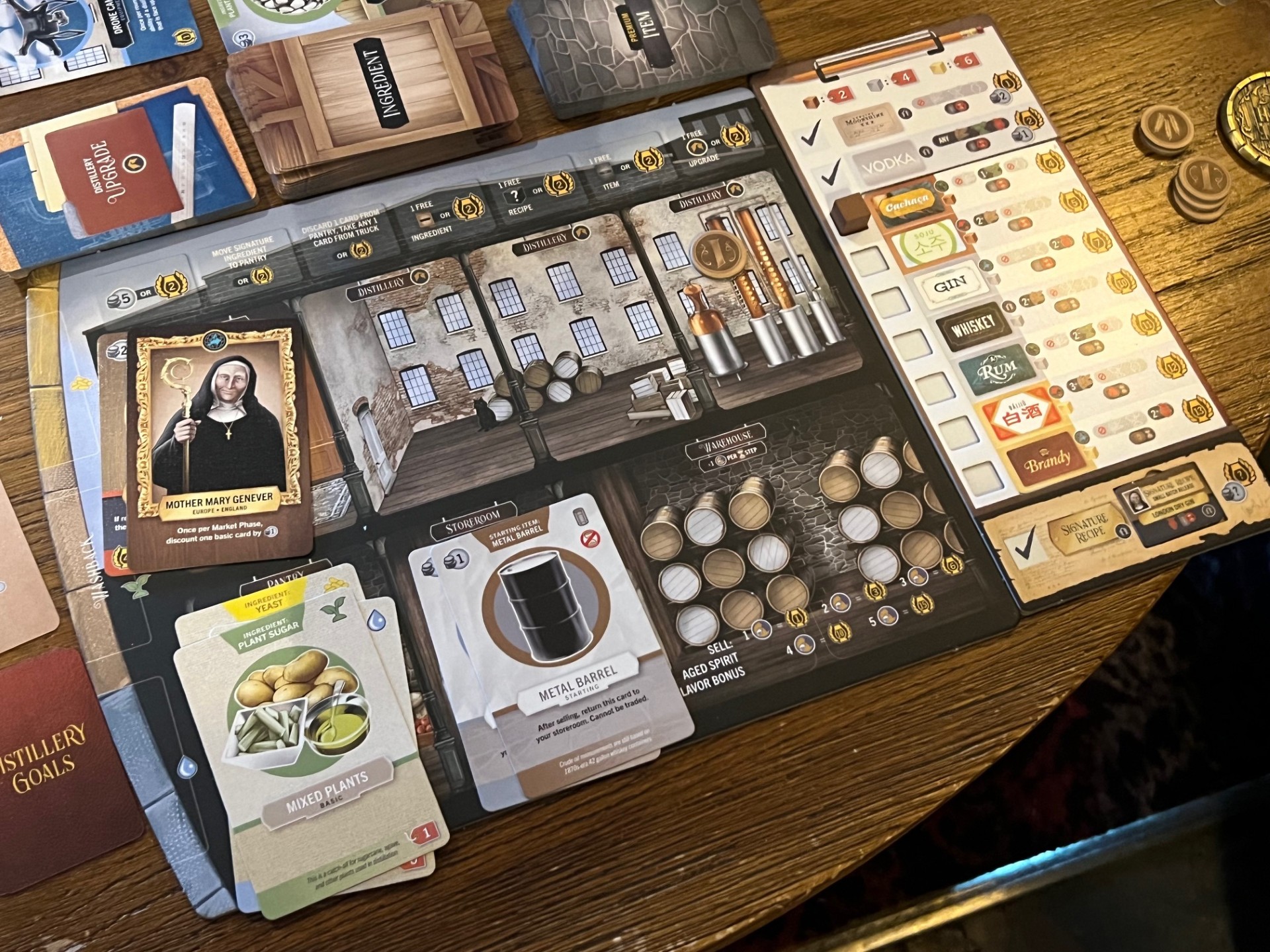
The idea of the game is that each round players will go through a market phase where they will gather ingredients — including basic ones such as yeast, water and various types of sugar, with the aim of working towards one of the recipes on their card. Aside from the two basic recipes (moonshine and vodka) each recipe needs to be learned, with bronze, silver and gold tier recipes coming at an increasingly high cost. If you guessed that higher tier booze likely scores more points, then you’re getting into what Distilled is all about already.
The thing is, each alcohol requires different ingredients, and some must be aged, whilst others cannot. If we look at Aquavit, for example, then players can use any grain or plant sugar in their distillation, but not fruit sugar. Aquavit cannot be aged, which means that the player who makes it will not be able to keep it at the end of the round — instead it will be sold immediately for money and points.
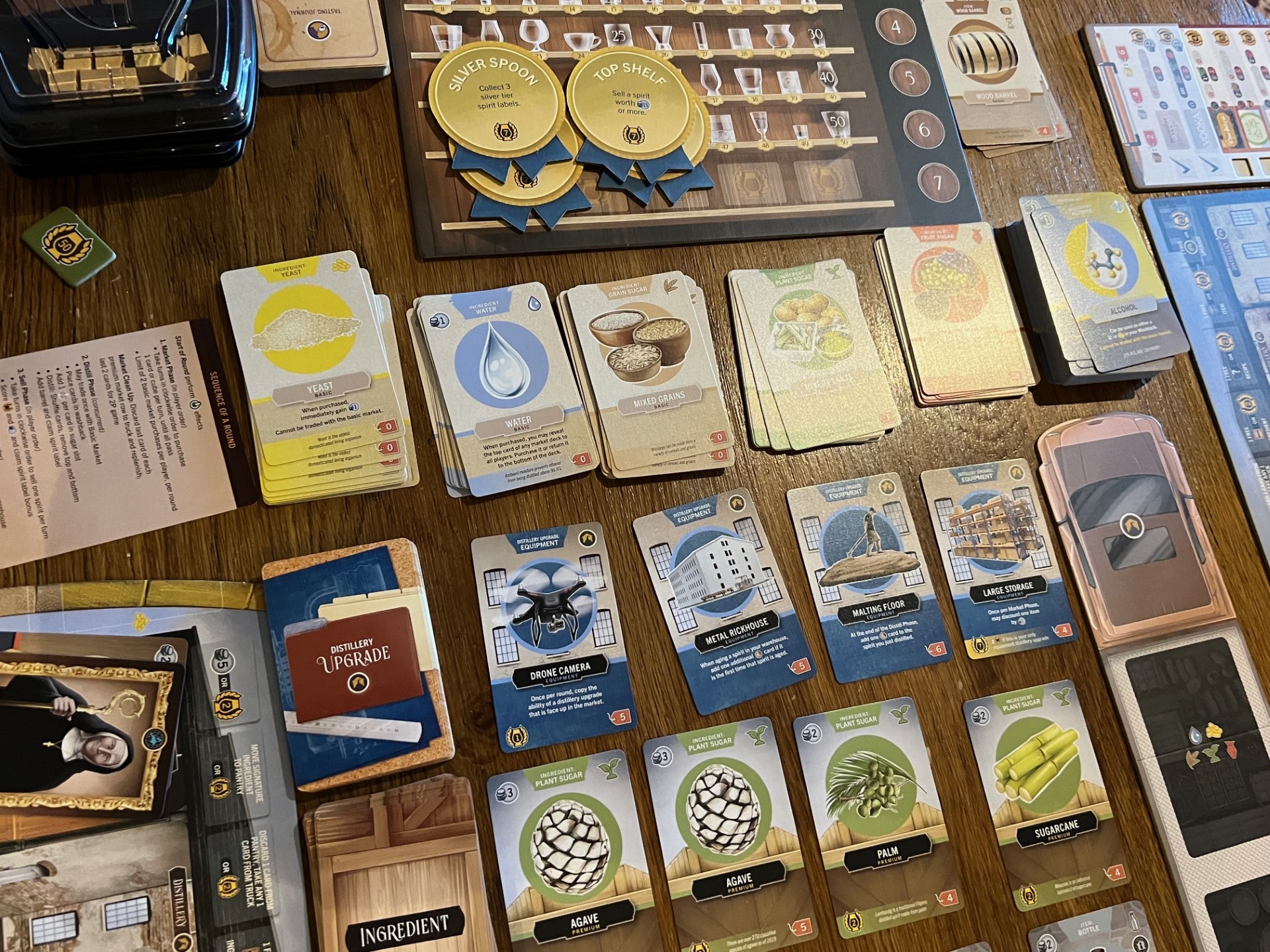
Whisky, on the other hand, must be aged, and it can only contain grain sugars — this means that when you’re distilling, you absolutely do not want any fruit or plant sugar cards in there. To age any spirit, you’ll also need a barrel that conveys the properties of the wood into the alcohol — for example an oak cask. A metal barrel won’t do this, and whilst clay barrels might work for other alcohols (like Sochu) they are no good for whisky. At the end of a round where you make an aged alcohol, you cannot sell it because it must age at least one round — but instead, it will receive a flavour card which is always worth at least one additional coin in value.
Appreciating that I skipped ahead a bit there to explain what happens towards the end of a distillation, let’s go back to the market phase of Distilled which is where a lot of the gameplay happens. During this phase, four rows of items will be on display — the basic ones (water, yeast, mixed grains, mixed plants, mixed fruits and basic clay and wooden barrels) which are always available, and then the premium market.
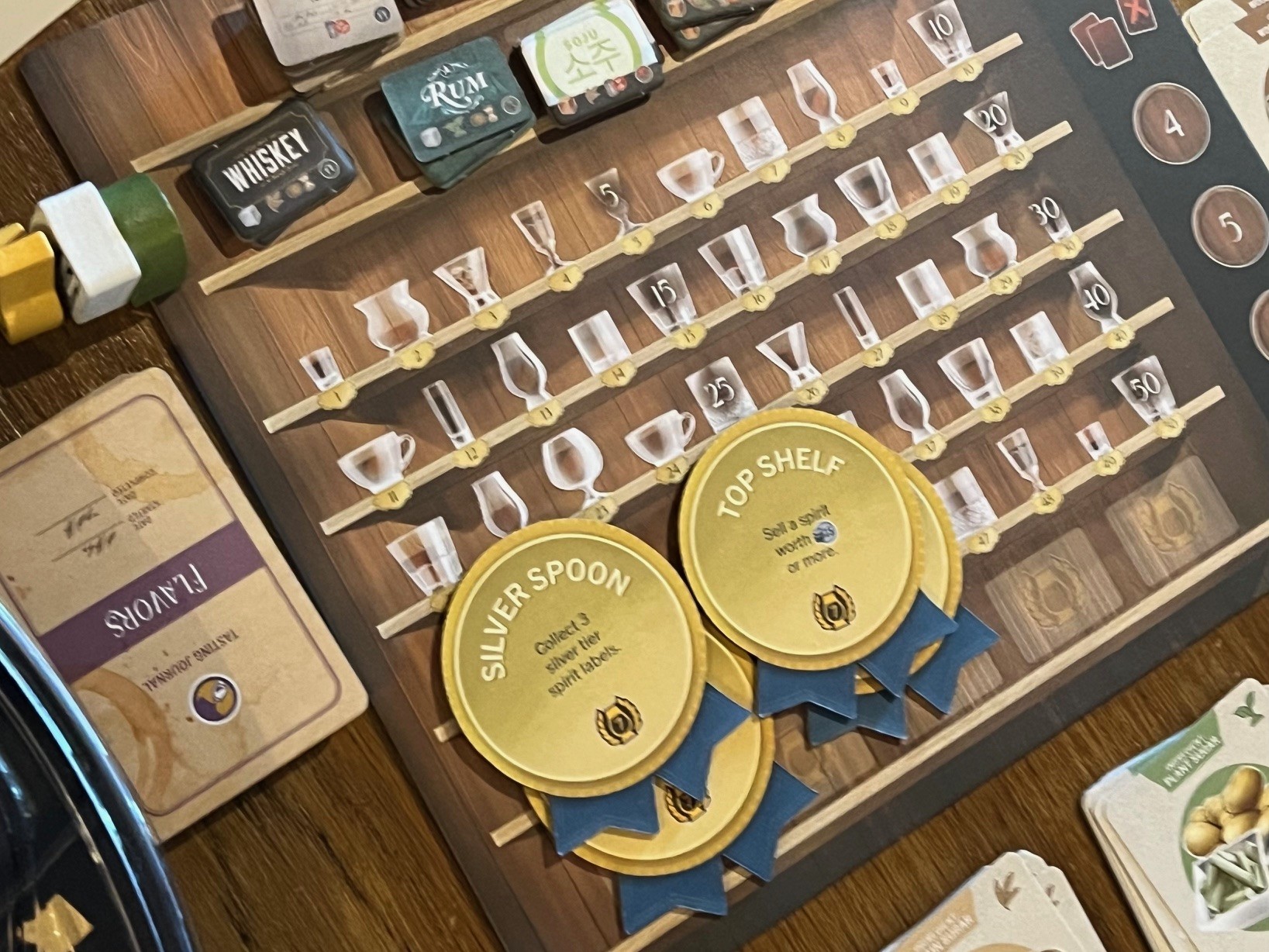
In the premium market, players can access distillery upgrades (which might generate free resources or income, or create end game points), premium ingredients (which include better, more refined types of grain, plant and fruit sugar) and premium items, which include bottles (used in set collection) and upgraded barrels.
Money is very tight in Distilled, but thankfully the basic ingredients are cheap. Yeast actually gives you one money when taken, whilst adding water to any spirit will increase the value of it when sold. The catch is, you can only take two basic ingredients per market phase, so Distilled often involves players managing a budget of between four and ten money, when what they need to do is learn a recipe that costs two to six, buy a barrel at something like four or five, and purchase one to three ingredients costing perhaps as much as four or five each.
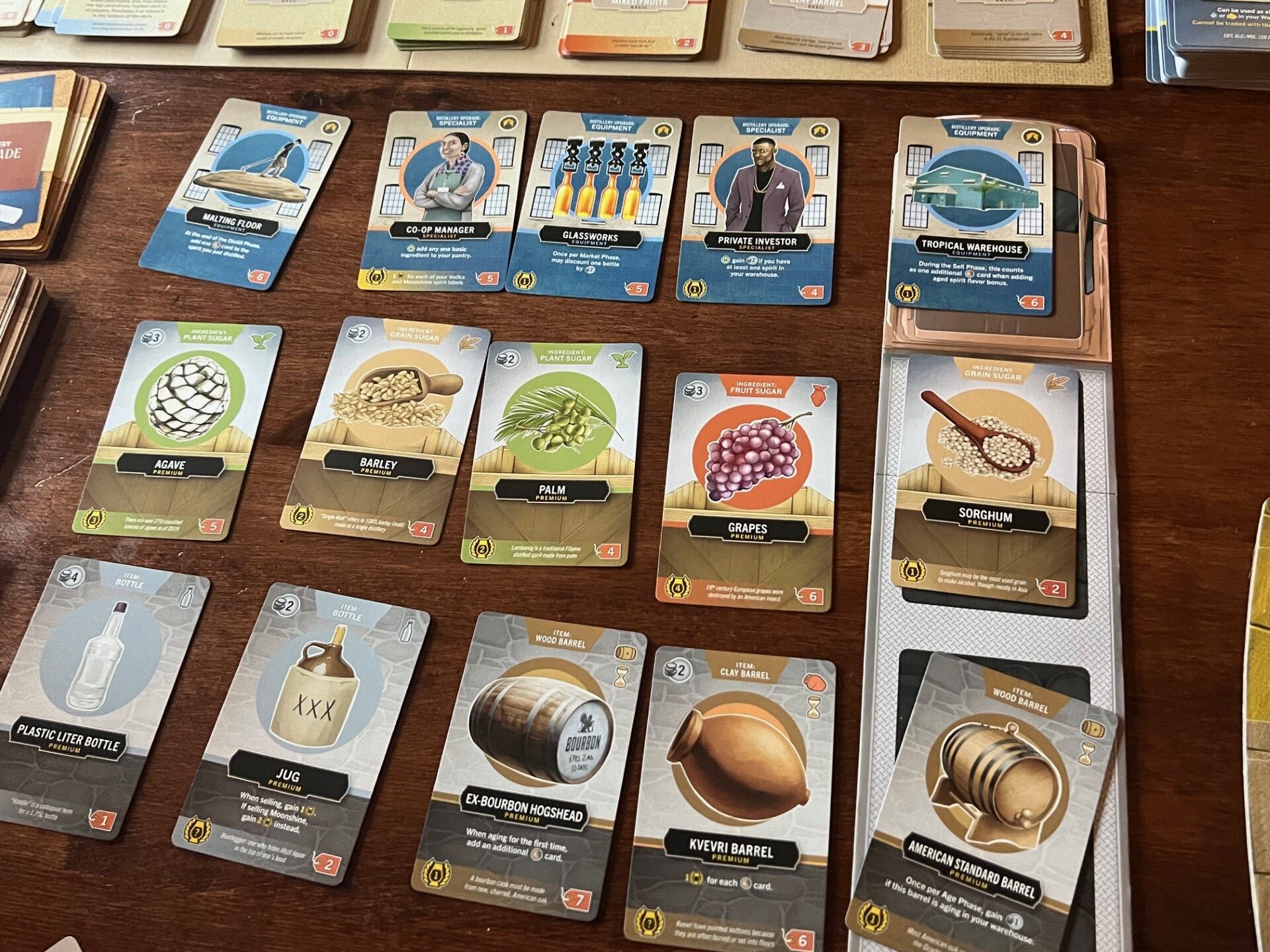
Composition of ingredients is important, because as I said above, most spirits must contain only specific types of sugar. During the washback phase of the game (after the market phase) players will decide what to add to their still. This involves taking as many yeast, water and sugar cards as they wish out of their pantry and adding them to the relevant spaces on their player board. At least one yeast, one water and one sugar is needed to make a spirit, but you can also add alcohol cards and as many sugar cards as you wish.
The players will then turn their collected ingredients over and shuffle the resulting deck, after which they will remove the top and bottom cards and put them back into the pantry (known as washback). There’s an element of risk here, because (for example) if you wanted to distil a whisky, but lost one or two grain cards in this phase, you may fall below the “two grain” threshold needed to make whisky. Equally, if you added a plant sugar to your still and it was not removed during this phase, then you won’t be able to make whisky because the plant flavours will contaminate the taste.
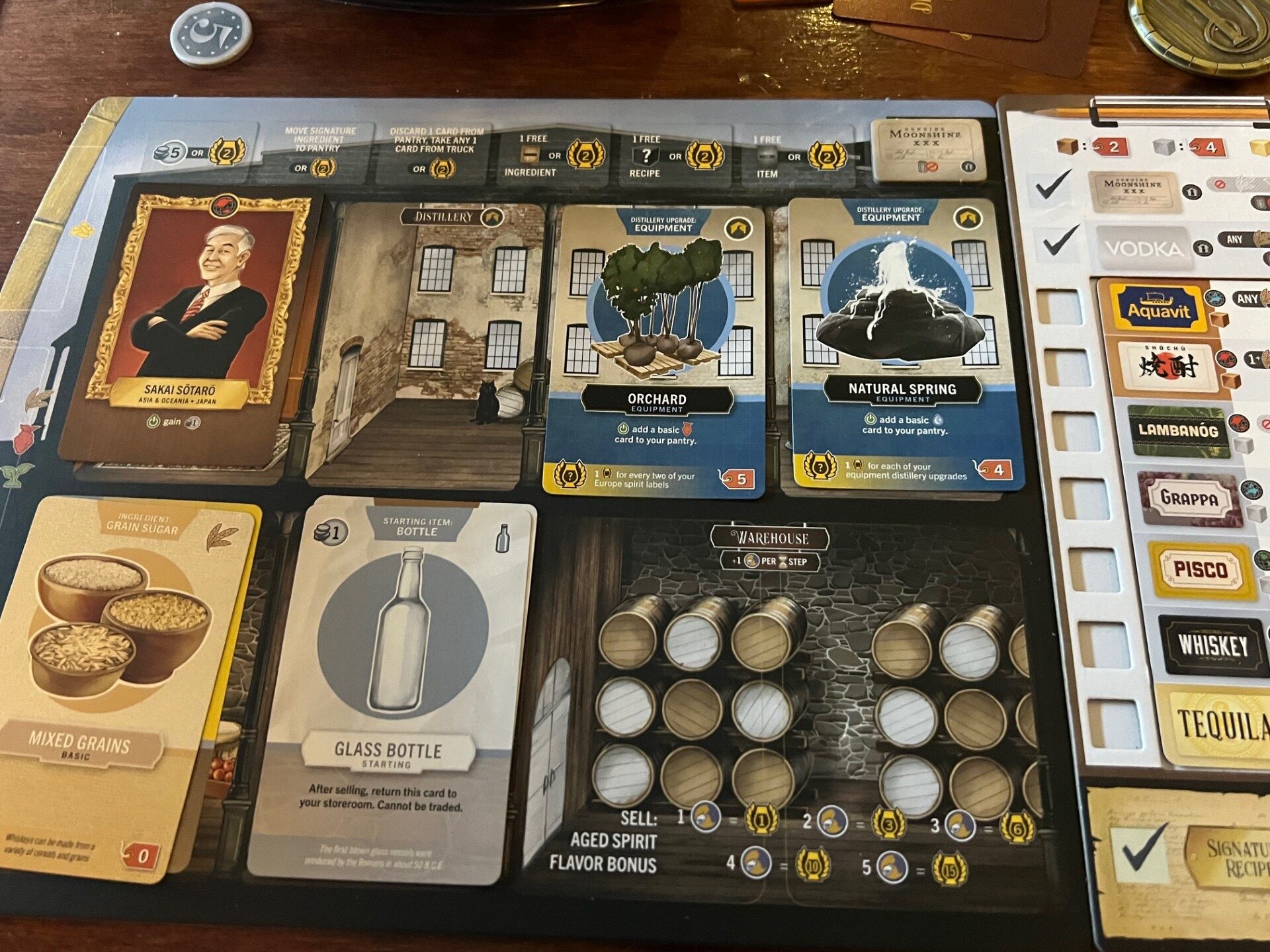
In either of these examples, you may still have enough flavours in your brew to create something other than whisky, assuming you know the recipes. In this example, you could probably make Aquavit (which requires just one sugar from either grain or plant) and you can almost always make vodka. Absolute worst case, if all your sugar disappears during washback, you will always be able to make moonshine.
Whatever you make, you will now take a spirit label for it (if there is one remaining) and cover a space on your player board to take a bonus. During the early game, I like taking a free distillery upgrade, but you will also need to use one of these bonus spaces to take your unique ingredient (which means you can make your signature spirit.) If you’re going to age your spirit, this is the moment where you’ll choose a barrel for it, which is placed on top of the stack and into your warehouse ready for ageing. Again, if you don’t have the correct barrel, you can’t make whisky (or any aged spirit) so you’ll have to drop down to Aquavit, Vodka or whatever.
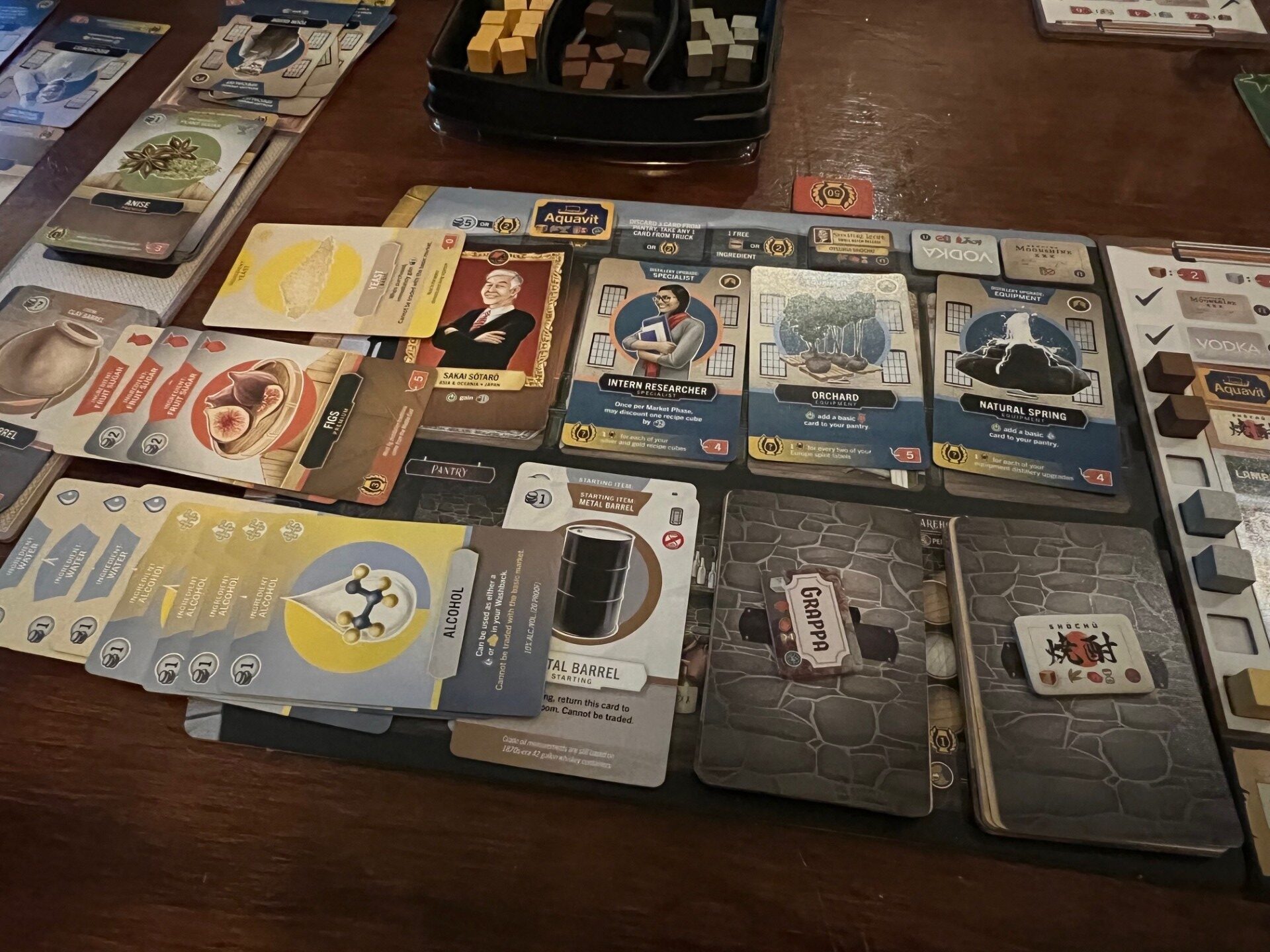
Points in Distilled come from selling spirits — whether aged or not — and from set collection elements. Collecting bottles from the same region (or having a set of three from different regions) will be worth points, as will completing objectives from the shared pool and from your own three personal objectives (which are reduced to two at the end of the third round). This is honestly a lot to take in during your first five or maybe even ten games.
I found it very difficult to focus on the restrictions of the alcohol I wanted to make, whilst also considering what region it was from, whether I had a bottle to match, how many personal and shared objectives it might meet and how many points it would score, whilst also keeping in mind my overall financial position and what the next round might look like (bearing in mind you may have one or two spirits ageing, plus one you are trying to make).
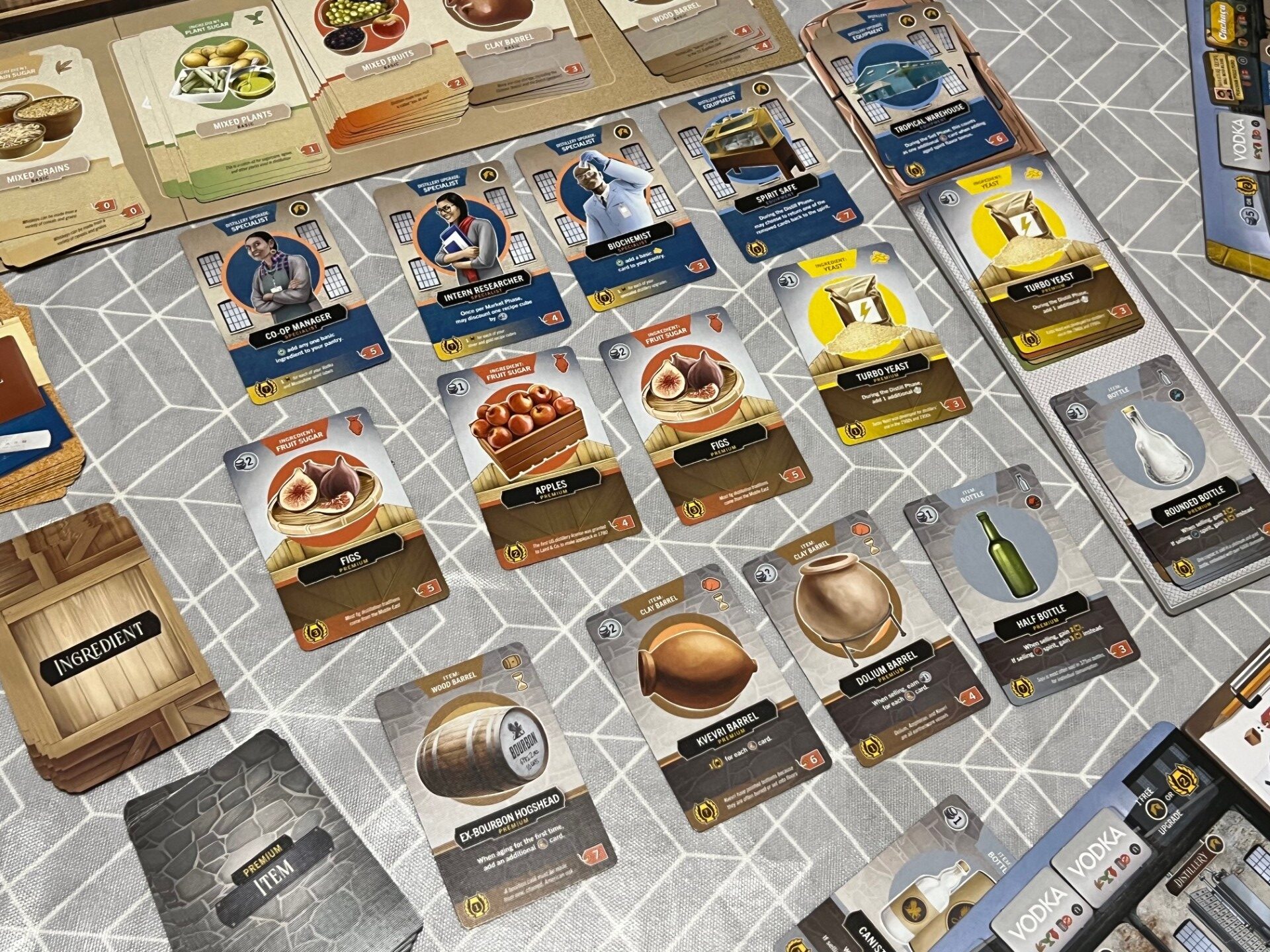
The complexity and variety of scoring take Distilled from being a middleweight game into a slightly meatier experience that still just about exists in the midweight kind of bracket. You do get used to this, but I’ve taught the game a couple of times without the personal objectives just to take some of that mental overload away and for new players I would recommend either taking similar steps or just being aware of who you are playing with and what kinds of games they like. To put it differently, Distilled is a game about alcohol, but it’s by no means a drinking game or a beer and pretzels type experience!
Overall, Distilled is an incredibly thematic game that really tells the story of distilling your own spirits and then selling them. It covers almost all bases of what I associate with the art of appreciating fine drinks with friends. From the flavour profiles you can add into your drinks, to the cask ageing and even how different kinds of bottle can affect perceived value. As a game, its mechanics match its theme and there is a nice mix of luck and planning at play, all of which fits nicely inside a tight economic puzzle. For me, Distilled is a very tasty wee dram!
You can purchase Distilled on Amazon.
Love board games? Check out our list of the top board games we’ve reviewed.
Comments are closed.